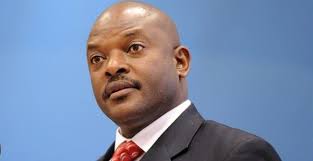Latest report published by the Amnesty International has accused the government of President Pierre Nkurunziza of Burundi of using “excessive force” in policing public demonstrations that had rocked the country since his declaration of controversial ‘Third-term’ bid on April 26, 2015.
The rights-advocacy group’s report entitled: ‘Braving Bullets: Excessive force in policing demonstrations in Burundi’ with Index number: ‘AFR 16/2100/2015’ was released on Thursday July 22.
According to the report, in his desperate bid to actualize his controversial third term, President Nkurunziza mobilized security forces that “repressed demonstrations as if they were an insurrection”.
“Burundi authorities sought not just to disperse demonstrations, but to punish protesters for expressing their political views”, the report reads in part.
Amnesty International’s reports also disclosed that Nkurunziza’s decision in April to seek a third term in office sparked off the street protests that have resulted in the deaths of more than 100 people. “It is a tragedy that demonstrators had to brave bullets to try to have their voices heard,” said Sarah Jackson, Amnesty International’s deputy regional director for East Africa, the Horn and the Great Lakes.
The report tries to bring into international limelight details of the government crackdown in the build up to the controversial presidential election boycotted by opposition parties. Nkurunziza is expected to be announced winner of the controversial elections.
Although, there are calls for Nkurunziza to form a national unity government to avert a conflict, the Amnesty International has warned that Burundi could be on the verge of prolonged conflict due to political events of recent months which it investigated. “Despite dozens of protesters killed, and a myriad more injured by police, the Burundian authorities have failed to investigate,” Jackson said.
According to the reports, police shot at unarmed protesters running away from them, and even children and women were not spared. “It was unbelievable. People were fleeing in the river, the police shot at people running away in the river,” Ntahangwa Bridge, who was present at a protest site in Bujumbura on May 4, told Amnesty International.
The investigators also reported that the government also clamped down on the media. “From the first day of the protests, authorities prevented radio stations from broadcasting outside of Bujumbura. On May 13, after military officers staged an attempted coup, the police physically attacked independent media facilities, and they have since been unable to broadcast,” the report says.
By Olisemeka Obeche
[divider]



